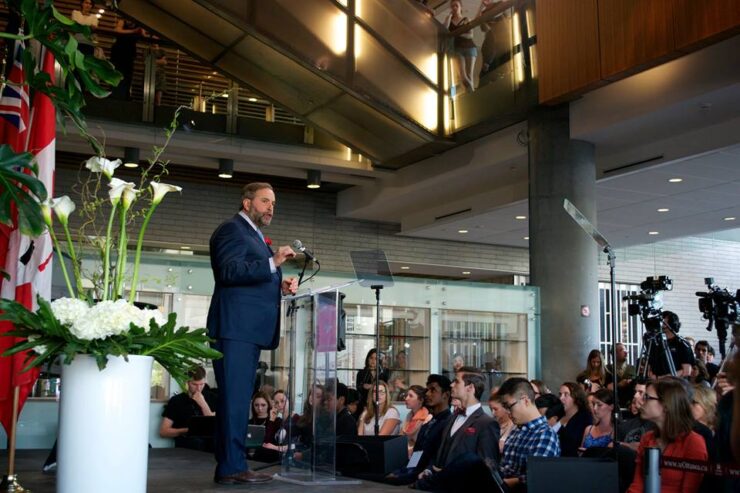Panel outlines strategies for carbon regulation
Photo courtesy of iVote.
This past week members of Canada’s three major political parties gathered in the Faculty of Social Sciences building at the University of Ottawa to discuss how environmental sustainability can be reconciled with political interests, and economic realities in Canada. The discussion was part of a series of iVote events at the U of O.
Leader of the NDP party, Thomas Mulcair was the keynote of the event, and he said his party offered “the sustainable approach Canadians want to see.”
The NDP is also running on investing in clean energy, and a cap-and-trade policy to deal with carbon emissions, where a limit is set on certain types of emissions, and companies are allowed to trade their unused emissions. Mulcair also stressed the need for heightened safety regulations when transporting dangerous goods.
Mulcair’s speech came following a historic NDP win in historically conservative Alberta.
The event also featured multipartisan debate on environmental regulation with Liberal environment critic, John McKay, NDP environment critic and deputy leader, Megan Leslie, and Bruce Hyer, Green Party MP, or “60 per cent of the Green Party caucus by biomass.”
A representative from iVote said they reached out to members of the Conservative party but they weren’t able to attend because “they all had scheduling conflicts.”
The discussion focused on the different parties’ environmental policies. The MPs discussed several issues including job creation and government investment, but the event centered on environmental regulation.
All three MPs were in favour of regulating Canadian corporations’ carbon output, but they differed on the best way to do so. “We need to price carbon, and I’m determined to price carbon,” said Hyer.
Leslie said she favoured a cap-and-trade policy to deal with carbon emissions, where a limit is set on certain types of emissions, and companies are allowed to trade their unused emissions. Hyer argued for a carbon fee and dividend policy, where carbon emitters are charged a fee, which is then given back to the population. McKay looked to give the provinces autonomy to deal with carbon emissions.
The Conservative party’s policy declaration says that the party “supports the legislated emissions caps to fight smog-causing pollutants… and supports initiative to cut air pollution from industry in half by 2015.”
One thing that all of those on the panel could agree on was the need for Canada to improve its worsening environmental reputation in the world.
“We used to be world leaders in this,” said Lesley, “what happened?”
Panelists also stressed the divergence between Canadian and American policies. McKay said that Canada won’t “be anywhere close to” meeting environmental targets outlined by the United States.
In 2013, a report released by the Centre for Global Developed ranked Canada last in environmental policy among 27 of the most developed nations, according to the Globe and Mail.
Canada “has the dubious honor of being the only (commitment to development index) country with an environment score which has gone down since we first calculated the CDI (in 2003),” said the report.
“This reflects rising fossil fuel production and its withdrawal from the Kyoto Protocol, the world’s only treaty governing the emissions of heat-trapping gasses. Canada has dropped below the U.S. into bottom place on the environment component.”





